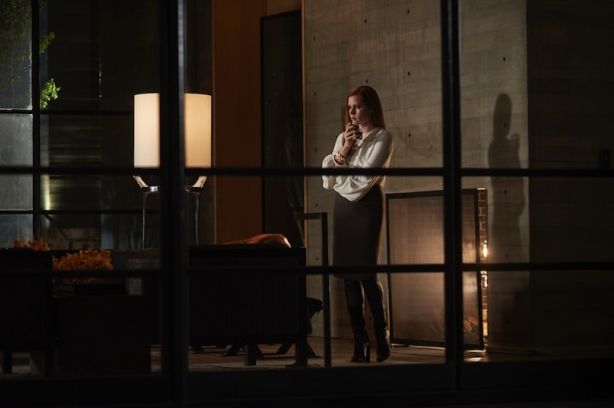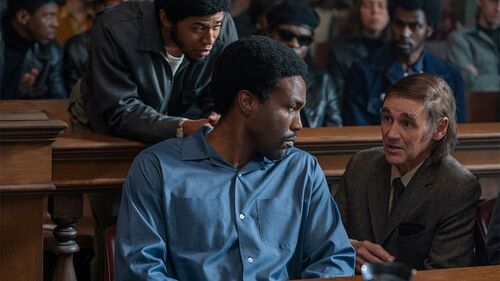
Nocturnal Animals
 Nocturnal Animals, Tom Ford’s gripping and devastating meta-textual mystery, left me heavy at heart. I am enamoured by impenitently bleak narratives but Ford manages to mesh character and tone in a queasy union that left some dissonance lingering within by the time the resolution tapped me on the shoulder.
Nocturnal Animals, Tom Ford’s gripping and devastating meta-textual mystery, left me heavy at heart. I am enamoured by impenitently bleak narratives but Ford manages to mesh character and tone in a queasy union that left some dissonance lingering within by the time the resolution tapped me on the shoulder.
I know it is based on a book but there is something intrinsically gimmicky about the multi-linear narrative Nocturnal Animals employs, which operates on different levels of reality but still drives towards a single truth. The surface narrative (ushered in by a sweeping score that resembled some 90s thriller fare) involves Susan (Amy Adams), an art gallery owner in Los Angeles. She is in an evidently unhappy second marriage to an affluent businessman (Armie Hammer) who has little time for her given the small matter of work and his side chicks.
The unfulfilling state of her marriage is sort of accentuated when Susan receives the manuscript of an unpublished novel from her first husband, Edward (Jake Gyllenhaal), seemingly out of nowhere. In later flashbacks, we see Edward is in that warm sensitive mould with the simple ambition of becoming a writer – something the young artsy Susan was initially drawn to but came to detest. What followed was infidelity with her current husband who is almost a polar opposite to Edward and the type of man Susan’s snooty mother would rather have her daughter settle down with.
Susan eventually came to mirror her mother and had no time for Edward’s ambitions or lack thereof as she callously declared he didn’t have what it took to become a successful author. But it turns out Edward is a brilliant writer, so much so that his eponymously titled manuscript transfixes Susan for the remainder of the film. With her husband away for a weekend, Susan dives into Edward’s novel and Ford obliges us dramatising its narrative. The noirish aegean LA aesthetic we are introduced to is replaced with a predominantly hellish hazy pallet in what plays out as riveting and distressing crime thriller set in Texas.
The novel, which Edward dedicates to Susan, follows a father, Tony who embarks on a road trip with his wife, Laura and daughter, Helen played by Isla Fisher and Ellie Bamber. Gyllenhaal plays Tony which is a bit on the nose although I am unsure if the dramatisation as we see it is a projection of Susan’s imagination or just part and parcel of the story. It however becomes apparent there is an emotional connect between the two characters Gyllenhaal portrays. You could further argue, by function of the film’s editing, that Susan too finds a connect as she immerses herself in the story, if just for a short while.
The story continues: the road trip takes the family through a remote desert at night where an innocuous attempt to overtake a crawling vehicle culminates in them being hounded by a gang of three rednecks led by a sleazy and menacing looking Aaron Taylor-Johnson complete with a porn-stache. It’s a simple but intense sequence which brought to mind Stephen Spielberg’s Duel and climaxes in despair for Tony. The film cuts between the novel’s narrative and real life as we are given some reaction shots from Susan and she is visibly horrified by the opening Edward crafts.
You can draw a link between the film’s title, Nocturnal Animals, and the redneck gang that rips into Tony’s life. As it becomes clear we are viewing Susan’s failed marriage with Edward through the book we start to gain an insight into scars that gave depressing unforgiving essence to it. The early sense of helplessness and despair in the novel is replaced by vengeance, rage and some regret as the book introduces your typical cowboy hat-wearing Texas lawman played terrifically by a terse intense-eyed (as always) Michael Shannon who is given a meaty character to work with in limited time.
The aforementioned sentiments of vengeance, rage and some regret filter in to real life as this novel represents Edward’s primal reflections on the failed marriage and affords Susan the chance to do same. From what we learn of the early Edward who came across as your average nice guy, a la weak, the novel was the only way he could truly bear out his emotions and vent at Susan and himself. I said Edward proved himself to be a brilliant writer but the irony is his book doesn’t exist without the dark genesis provided by Susan’s apparently cruel heartbreak.
There is a petty vibe at the heart of Nocturnal Animals, one I would have found amusing if Ford hadn’t so expertly succeeded in rooting the audience in the perspective of the characters violently prodded with a rod sweltering in malice. The brilliant central performances also do their bit to draw us in with Adams who is quite deliberately economical in her reactions with each emotionally weary gasp and a lot of understated stuff with her eyes providing a window to her soul. Gyllenhaal is more animated in the emotions he conveys as he plays two characters.
I struggle to find any misstep in Ford’s approach. Whilst Nocturnal Animals' narrative style still bugs me, it is undeniably effective. There are no winners here. That becomes obvious when you mull on Shannon's lawman who is in the epilogue of his life or on final moments of the novel or indeed the final moments of the film as we stare into Susan's eyes for the final time with unexpected sympathy.
-
By: Delali Adogla-Bessa/delalibessa@yahoo.com/Ghana


